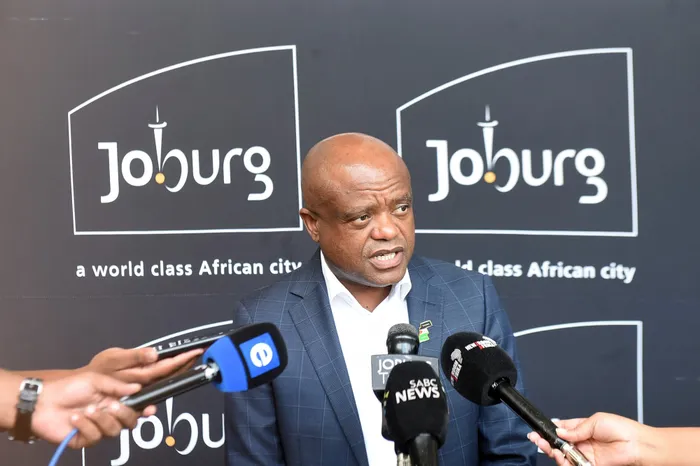City Power’s free electricity drive brings relief to struggling households
SERVICE DELIVERY

Mayor of Johannesburg Dada Morero.
Image: Itumeleng English Independent Newspapers
Mayor of Johannesburg Dada Morero says Johannesburg has taken significant strides to address energy inequality through its innovative Free Basic Electricity programme. Since its launch on 17 June, the initiative has offered a lifeline to low‑income households, with more than 650 homes already registered to receive 50 kilowatt‑hours of electricity each month at no cost.
This drive is not merely about power distribution; it is a declaration of dignity, says Morero. “Electricity should not be a luxury for the few. It is a necessity for everyone,” he told community members at a recent briefing. “Our government must ensure that even those with the least still have access to the basics.” The programme is aimed at households earning under R7 500 per month, including pensioners, unemployed families, child‑headed households, and recipients of social grants.
Morero sees the Free Basic Electricity initiative as a cornerstone of a broader vision to reform infrastructure and energy access within the city. His administration has also pledged to eliminate load shedding in Johannesburg within two years by forging partnerships with private energy suppliers and investing in alternative sources of power. These efforts are complemented by campaigns to encourage energy efficiency and smarter consumption among ratepayers.
Morero said he draws on personal experience to understand the challenges faced by under‑resourced communities. He believes that inclusive governance must start with practical measures that immediately improve people’s lives. “This is a step toward narrowing the gap between the privileged and the poor,” he said. “It is a signal that this city cares, and that help is not just promised, but delivered.”
City Power’s CEO, Tshifularo Mashava, emphasises that this initiative delivers more than just electricity units. “This is about dignity,” she said. “It is about making sure a child has light to study by and families can prepare meals and heat water. We are talking about the basic right to live in a safe and warm environment.” By guaranteeing a steady supply of 50 kilowatt‑hours per month, families can rely on enough power for essential tasks, reducing their dependence on dangerous alternatives such as open flames.
Moreover, beneficiaries are exempt from the R230 monthly electricity surcharge introduced in July. For households already under pressure from the rising cost of living, this exemption provides vital breathing space that could make a significant difference in their ability to afford food, transport, or school supplies.
To qualify, applicants must be South African citizens or permanent residents, legally occupy their property, and provide proof of identity, residence, income, and a municipal account. While the registration target ends on 31 July, Mashava warns residents not to wait. “We have the teams, the systems, and the capacity. Now we need the public to step forward. We do not want anyone who qualifies to miss this opportunity.”
City Power has deployed dedicated outreach teams throughout all seven regions of Johannesburg. These officers go door to door, helping residents complete forms, gather necessary documents, and resolve issues that might prevent them from qualifying. In many cases, faulty or unregistered electricity meters have posed a barrier. City Power has responded by offering free meter replacements and repairs for those willing to regularise their connections—no fines, no penalties.
This approach reflects Morero’s philosophy of service delivery with compassion. By easing technical and administrative burdens, the administration aims to bring as many households as possible into the programme, ensuring alignment with its goal of reducing energy inequality.
Beyond immediate relief, the Free Basic Electricity programme is part of a longer‑term vision. Morero’s office is addressing systemic issues such as outdated infrastructure and unequal spatial development. Load shedding remains a challenge across South Africa, and Johannesburg is no exception. The city’s strategy involves partnerships with independent power producers and investment in renewable energy projects, especially solar solutions for public facilities and social housing.
At the same time, the administration is working on revenue optimisation through improved billing and financial management, using the funds to reinvest in infrastructure upgrades. Morero’s finance planning includes achieving a revenue collection threshold of over 90% for rates and services. This generates more resources for technological innovation and citywide service delivery.
Community feedback has been overwhelmingly positive, with many beneficiaries reporting immediate improvements in daily life. Grandmothers like 72‑year‑old Phindile Mokoena from Soweto said the free electricity allowed her to boil water and keep warm in winter without worrying about her small pension. Similarly, teachers working from home have praised the scheme for providing reliable lighting to prepare lessons and support children’s remote learning needs.
Still, gaps remain. City Power and Morero’s office recognise these shortfalls and are intensifying efforts to register the hard‑to‑reach, including residents in informal settlements and those facing language or documentation barriers.
As the 31 July deadline approaches, the administration is pushing hard to ensure no eligible household misses out. City Power encourages residents to visit service centres or apply online. With strong political will, a compassionate approach, and an efficient system, the Free Basic Electricity programme could become a model for other cities grappling with energy poverty.